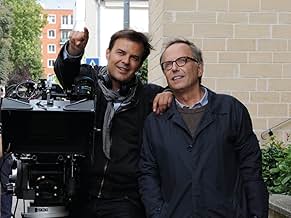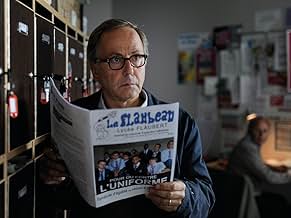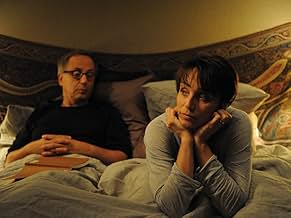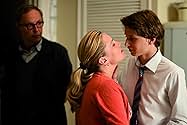CALIFICACIÓN DE IMDb
7.3/10
35 k
TU CALIFICACIÓN
Un profesor de francés de secundaria se ve atraído por la historia cada vez más transgresora de un estudiante precoz, y su relación con la familia de un amigo.Un profesor de francés de secundaria se ve atraído por la historia cada vez más transgresora de un estudiante precoz, y su relación con la familia de un amigo.Un profesor de francés de secundaria se ve atraído por la historia cada vez más transgresora de un estudiante precoz, y su relación con la familia de un amigo.
- Dirección
- Guionistas
- Elenco
- Premios
- 10 premios ganados y 23 nominaciones en total
Jana Bittnerová
- La doublure de la jumelle
- (as Jana Bittnerova)
- Dirección
- Guionistas
- Todo el elenco y el equipo
- Producción, taquilla y más en IMDbPro
Opiniones destacadas
A wicked little movie that tries to brake boundaries and more than the fourth wall. It raises up a lot of questions and puts up the mirror to a lot of things, while continuously being funny and wicked at the same time. A hilarious attempt at describing what Art means nowadays or how we try to interpret it. Maybe even how we try to create it.
There is more than one story strand in this movie and they all get at least somewhat explored. And while some of those strands may feel like a cliché, the head on approach make them feel like a fresh take on it. You have to have an open mind about the movie and the way it is shot and told, but if you can do that, you might be able to enjoy this very much. Multiple views can also bring up new and exciting things you might not have seen first time around. Whatever the case, I can recommend this to anyone who wants to be intellectually challenged by watching a movie.
There is more than one story strand in this movie and they all get at least somewhat explored. And while some of those strands may feel like a cliché, the head on approach make them feel like a fresh take on it. You have to have an open mind about the movie and the way it is shot and told, but if you can do that, you might be able to enjoy this very much. Multiple views can also bring up new and exciting things you might not have seen first time around. Whatever the case, I can recommend this to anyone who wants to be intellectually challenged by watching a movie.
This is a very interesting film taking both the point of view of a sixteen year old school boy and that of a middle aged teacher, with you dear viewer, playing yet another role. Ah ha, so, what we start with is a perhaps knowingly voyeuristic homework task set by the bored literacy tutor. Then we have the youth delivering precisely the kind of inflammatory story that reignites the tutor's interest. It's a dangerous game they both play - almost as if the boy were repeating the tutor's own youth with his post hoc adult knowledge. The innocents in this tale are ignored - or rather, their real stories are overlooked by both boy writer and his tutor whilst they play their silly game. The tutor's wife sees through the whole charade but then even her story is corrupted by inclusion in the boy's story-making. You, the viewer, need to pick carefully through the evidence you are presented. Do you want the boy to succeed? Do you want to encourage the teacher? Shame on you! You've gone down a garden path you should never have entered! Brilliant!
For his thirteenth feature film, French New Wave director Francois Ozon has outdone all acclaim given to his 2002 remake of "8 Women" with a mischievous and dysfunctional tale, of what can be perceived as
coming-of-age.
A black comedy conflated with so much grandeur from literary greats to post-modern poioumena, you cannot help but wave the white flag and just go along in service of jest and sheer curiosity.
Adapted from a brilliant play written by Juan Mayorgo, this film is a meta-narrative centered on Claude Garcia (Ernst Umhauer) -- a sixteen year old loner who intrudes upon the home life of fellow student Rapha Jr., and writes about it. What begins as a one-off weekend assignment for literature class, escalates with great passion and frequency when Claude's teacher, Germaine (Fabrice Luchini) detects flashes of talent and decides to groom the teenager.
Here, Ozon proposes a three-fold narrative weaving through the surface of three realities -- Germaine's growing obsession with Claude's story imitates the viewers' relationship with Ozon's film (and perhaps soap opera addiction), and Claude as a self-conscious narrator of the events occurring inside Rapha's house.
When the film begins, Claude is unhappy with a lonely life and clearly needs to distract himself with wholesome family warmth. Having witnessed Rapha's close relationship with parents Rapha Sr. and Esther at the school gate, strikes a friendship with the boy when semester begins. Establishing himself as a math tutor and study mate, Claude quickly wins their affection and trust. Thrilled by this opportunity to experience life with a sense of belonging, yet predisposed to primitive urge, Claude's desire swells into furtive yearning for Esther. And naturally, things get complicated.
As Germaine's involvement with Claude's writing departs from passive reader, to that of a story-telling coach superimposing rules of dramatic structure, it occurs to the viewer that he may very well be a shaping hand in the outcome of this voyeuristic experiment.
Of course, the fabrics of fiction and reality overlap but they do not confuse -- the satirical logic unfolds in ways that are thought- provoking, humorous and downright captivating.
cinemainterruptus.wordpress.com
A black comedy conflated with so much grandeur from literary greats to post-modern poioumena, you cannot help but wave the white flag and just go along in service of jest and sheer curiosity.
Adapted from a brilliant play written by Juan Mayorgo, this film is a meta-narrative centered on Claude Garcia (Ernst Umhauer) -- a sixteen year old loner who intrudes upon the home life of fellow student Rapha Jr., and writes about it. What begins as a one-off weekend assignment for literature class, escalates with great passion and frequency when Claude's teacher, Germaine (Fabrice Luchini) detects flashes of talent and decides to groom the teenager.
Here, Ozon proposes a three-fold narrative weaving through the surface of three realities -- Germaine's growing obsession with Claude's story imitates the viewers' relationship with Ozon's film (and perhaps soap opera addiction), and Claude as a self-conscious narrator of the events occurring inside Rapha's house.
When the film begins, Claude is unhappy with a lonely life and clearly needs to distract himself with wholesome family warmth. Having witnessed Rapha's close relationship with parents Rapha Sr. and Esther at the school gate, strikes a friendship with the boy when semester begins. Establishing himself as a math tutor and study mate, Claude quickly wins their affection and trust. Thrilled by this opportunity to experience life with a sense of belonging, yet predisposed to primitive urge, Claude's desire swells into furtive yearning for Esther. And naturally, things get complicated.
As Germaine's involvement with Claude's writing departs from passive reader, to that of a story-telling coach superimposing rules of dramatic structure, it occurs to the viewer that he may very well be a shaping hand in the outcome of this voyeuristic experiment.
Of course, the fabrics of fiction and reality overlap but they do not confuse -- the satirical logic unfolds in ways that are thought- provoking, humorous and downright captivating.
cinemainterruptus.wordpress.com
There are certainly many meanings underneath the veil of comedy of this movie. Indeed, defining "Dans la maison" a comedy would be reductive, in the same way as thriller sounds out of tune. And it's really difficult to assign a precise category to it. It's a multifaceted movie, showing different levels of interpretation. From the point of view of the teacher, it's a subtle reflection of a middle aged failed man, who has to come to terms with his failure as a writer, and his incapability to inspire enthusiasm in class of bored students. From the point of view of the wives, it's a refined portrait of middle aged unsatisfied women, and their need to find any kind of escape or consolation. But above all, the movie offers a lucid and intelligent gaze on people's voyeuristic curiosity, on how much we are ready to do in order to see what happens behind closed doors and walls, and here the pair teacher-student works perfectly, and develops through the quick-paced writing of a story where the boundaries between reality and fiction become more and more faded, thus making it intriguing and engrossing. On this aspect, the movie is also a reflection on the process itself of artistic creation, which can seduce the reader or the viewer with an incredible power of attraction. A movie which certainly offers a perfect balance between suspense and entertainment, supported by a talented young and mature cast, involving the viewer till the utmost, and moving us to an unpredictable and gripping finale.
In the House (2012)
Another curious reality shifting movie in the most subtle and old fashioned of ways—the realism of good fiction. A young writer creates a reality in his essays that is shown as if real on screen. The characters around the writer, and within the fictional story, get intertwined because they are all the same. This game of deception is coy but also witty and warm, and it's a fun, genuine movie.
I'm not sure how much logic you should try to apply to things here. I assume they have it worked out perfectly, but watching it lightly the layers of reality get necessarily confusing. In a way this doesn't matter, because you get the general drift.
Which is this: a literature teacher in high school has a talented student, Claude, who writes fictional essays about real people. One is another student, Rapha, and we see events in this other student's house because of the writing (and have to guess whether or not those events are fact or fiction).
The teacher talks to Claude about the content, wondering if it's fair to lay open Rapha's life, and the student smartly says that it was written for the teacher alone. This brings the teacher into the story in ways he doesn't suspect. It also shows the audience that Claude is outfoxing his teacher and we are going to see a game played as Claude's writings raise reactions in the teacher that affect the fictional plot. Or is it the actual plot? Or both?
Exactly.
The director, Francois Ozon, is no stranger to this type of game playing. The famous earlier film of his in the U.S. is "Swimming Pool," a remake of an earlier film that has the same tricks played on the audience. It's never quite enough to have this slippery reality be the basis of a movie, and in "Swimming Pool" the events became quite dramatic and psychologically interesting. The ambitions for "In the House" are smaller and less chilling, and in a way less effective, but also less sensationalist and more believable. We have here more of an ensemble piece, a charmer, a play brought to the screen.
And it does rise above mere literary cleverness because of the leading man, the teacher, played by Fabrice Luchini, who will be familiar even to American audiences. His wife is the dependable Kristin Scott Thomas (speaking in French). The two of them make a likable intellectual couple (and her own role as an contemporary art dealer plays a small part in the plot). The way they talk about Claude's regular installments is how we get to think about the interweaving of realities.
And does it ever get interwoven. Keep track of it is you can. Otherwise, just enjoy the show.
Another curious reality shifting movie in the most subtle and old fashioned of ways—the realism of good fiction. A young writer creates a reality in his essays that is shown as if real on screen. The characters around the writer, and within the fictional story, get intertwined because they are all the same. This game of deception is coy but also witty and warm, and it's a fun, genuine movie.
I'm not sure how much logic you should try to apply to things here. I assume they have it worked out perfectly, but watching it lightly the layers of reality get necessarily confusing. In a way this doesn't matter, because you get the general drift.
Which is this: a literature teacher in high school has a talented student, Claude, who writes fictional essays about real people. One is another student, Rapha, and we see events in this other student's house because of the writing (and have to guess whether or not those events are fact or fiction).
The teacher talks to Claude about the content, wondering if it's fair to lay open Rapha's life, and the student smartly says that it was written for the teacher alone. This brings the teacher into the story in ways he doesn't suspect. It also shows the audience that Claude is outfoxing his teacher and we are going to see a game played as Claude's writings raise reactions in the teacher that affect the fictional plot. Or is it the actual plot? Or both?
Exactly.
The director, Francois Ozon, is no stranger to this type of game playing. The famous earlier film of his in the U.S. is "Swimming Pool," a remake of an earlier film that has the same tricks played on the audience. It's never quite enough to have this slippery reality be the basis of a movie, and in "Swimming Pool" the events became quite dramatic and psychologically interesting. The ambitions for "In the House" are smaller and less chilling, and in a way less effective, but also less sensationalist and more believable. We have here more of an ensemble piece, a charmer, a play brought to the screen.
And it does rise above mere literary cleverness because of the leading man, the teacher, played by Fabrice Luchini, who will be familiar even to American audiences. His wife is the dependable Kristin Scott Thomas (speaking in French). The two of them make a likable intellectual couple (and her own role as an contemporary art dealer plays a small part in the plot). The way they talk about Claude's regular installments is how we get to think about the interweaving of realities.
And does it ever get interwoven. Keep track of it is you can. Otherwise, just enjoy the show.
¿Sabías que…?
- TriviaErnst Umhauer said this about the character he plays in the movie: "He confuses his writing with reality and turns everything in his path upside-down. He has no distance, it takes him a long time to realize his words are stinging and can do damage. He's smart, but not very conscious of his responsibility".
- Errores(at around 1h 35 mins) While Claude is walking through park, his hair is parted on different sides between shots.
- Citas
Claude Garcia: But I love you.
Esther Artole: No. It's not me you love. It's an image. An image in your head.
- Créditos curiososThe opening credits are shown as if they were hand-written on graph paper.
- ConexionesReferenced in La noche de...: La noche de... En la casa (2018)
- Bandas sonorasDynasty Tching Memories
Interprete par Wang Shu Imperial Orchestra
Arrangement de Thierry Woelfel
®2002 FGL Productions S.A, © Editions FGL
Avec l'aimable autorisation de FGL Productions S.A
Selecciones populares
Inicia sesión para calificar y agrega a la lista de videos para obtener recomendaciones personalizadas
- How long is In the House?Con tecnología de Alexa
Detalles
- Fecha de lanzamiento
- País de origen
- Sitios oficiales
- Idioma
- También se conoce como
- In the House
- Locaciones de filmación
- Productoras
- Ver más créditos de la compañía en IMDbPro
Taquilla
- Total en EE. UU. y Canadá
- USD 389,757
- Fin de semana de estreno en EE. UU. y Canadá
- USD 31,441
- 21 abr 2013
- Total a nivel mundial
- USD 16,190,771
- Tiempo de ejecución1 hora 45 minutos
- Color
- Mezcla de sonido
- Relación de aspecto
- 1.85 : 1
Contribuir a esta página
Sugiere una edición o agrega el contenido que falta

Principales brechas de datos
What is the streaming release date of En la casa (2012) in Canada?
Responda




























